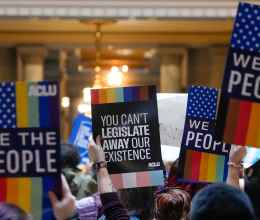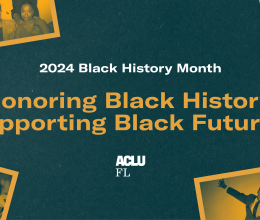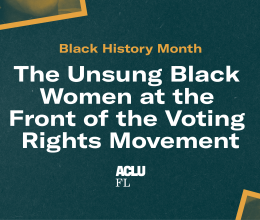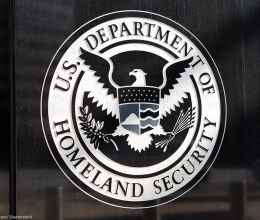
The National Voter Registration Act (NVRA) is often referred to as the “motor voter” law because it requires states to offer voter registration at the DMV. The statute also requires certain state and local agencies, including public assistance and disability agencies providing Medicaid, Supplemental Nutritional Assistance Program (SNAP), and other similar programs, to provide clients with the opportunity to register to vote and assistance with registering whenever they apply for or recertify their benefits or submit a change of address.
Unfortunately, it is all too common for states to neglect or ignore the NVRA requirements. Many states recently upgraded to online systems to streamline the process for clients to apply for and recertify their benefits, but failed to provide NVRA required voter registration opportunities through these new platforms. Other states incorrectly place the burden on clients by making receiving a voter registration form an opt-in rather than opt-out process. And many states completely fail to provide clients with the opportunity to register or update their voter registration when they report a change of address.
As a result, millions of Americans — particularly low-income, minority, and disabled citizens, all of whom are already underrepresented in the electorate — are illegally denied their federally-mandated opportunity to register to vote. Low income voters traditionally face numerous obstacles to voter registration and, consequently, have among the lowest registration rates. More than 85 percent of citizens with a family income at or above $150,000 were registered to vote in November 2016, compared to only 57.7 percent of those with incomes below $10,000.[1] Low income voters are also more likely to move frequently and thus need to update their voter registration address.
In order to help rectify these NVRA violations, the ACLU Voting Rights Project, along with our partner organizations, have engaged in extensive litigation and advocacy to ensure that citizens with low incomes are provided the voter registration services they are legally entitled to. As a result, this year multiple states agreed to extensive mail campaigns to provide voter registration packets, including registration applications, to public assistance clients.
As of today, almost 3 million Medicaid, SNAP, and Low Income Energy Assistance (LIEAP) clients in Arizona, Kansas, Michigan, North Carolina, and Virginia have received voter registration applications in the mail. And due to the ongoing mailings, that number will grow before the fall voter registration deadlines. For example, in Arizona each month approximately 100,000 Medicaid clients will receive these mailings until the state’s NVRA violations are permanently resolved.
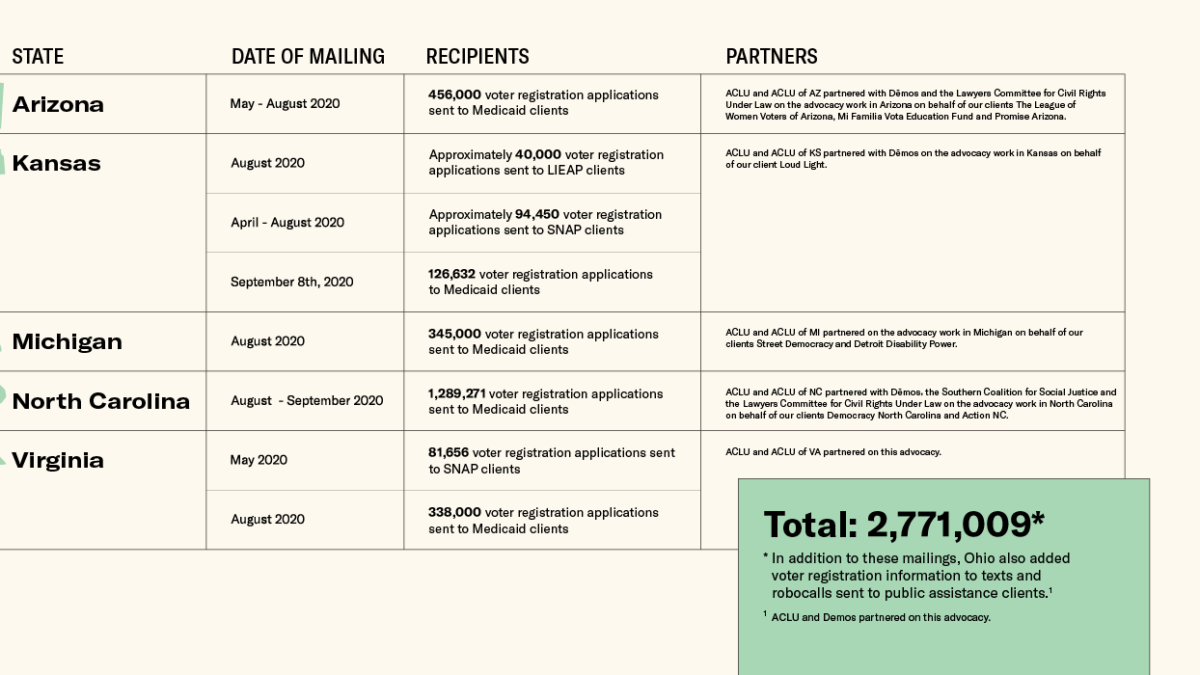
The timing of these mailings is particularly important during the COVID-19 pandemic. Voter registration rates traditionally peak in the lead up to a presidential election, as new voters prepare to cast their ballot for the first time and seasoned voters update their registration. But the pandemic prevented most in-person voter registration opportunities, leading to drastic declines in registrations in many states.
Many voters register or update their address during a transaction at the DMV, and voter registration groups also play a large role in registering new voters, often through community events or door knocking. Stay at home orders, social distancing recommendations, and office closures limited these opportunities this year, and the impacts are drastic. For example, organizations in Florida registered 14,144 voters in January but only 133 in April. Although 39 states and DC now offer some voters the opportunity to register online, it has not made up for these lost in-person opportunities. In January and February 2020, voter registration rates far outpaced those of 2016. After the pandemic began in earnest in the U.S., one study found that new voter registrations dropped 70 percent in April compared to January in 11 states and D.C.
Further, in response to the pandemic, many states implemented emergency changes to the process for obtaining or renewing SNAP benefits. These changes are crucial to ensuring food assistance, but because SNAP clients must be provided voter registration during renewals, postponed deadlines have the unintended consequence of limiting registration opportunities. To help address the problem, we worked with states to provide additional mailings, texts, and calls to public assistance clients regarding voter registration opportunities.
While these efforts can never undo the impacts of ongoing systemic NVRA violations and systemic voter suppression, they will at least provide millions of citizens the opportunity to register and vote in November.
[1] U.S. Census Bureau, Current Population Survey, November 2016, https://www.census.gov/data/tables/time-series/demo/voting-and-registration/p20-580.html.
Ceridwen Cherry, Staff Attorney, ACLU Voting Rights Project,
& Sarah Brannon, Managing Attorney, ACLU Voting Rights Project
